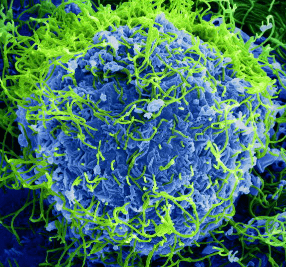Ebola virus and Marburg virus:
These are related viruses that may cause hemorrhagic fevers. These are marked by severe bleeding (hemorrhage), organ failure and, in many cases, death. Both viruses are native to Africa, where sporadic outbreaks have occurred for decades. Ebola virus and Marburg virus live in animal hosts. Humans can get the viruses from infected animals. After the initial transmission, the viruses can spread from person to person through contact with body fluids or unclean items such as infected needles. No drug has been approved to treat Ebola virus or Marburg virus. People diagnosed with Ebola virus or Marburg virus receive supportive care and treatment for complications. One vaccine has been approved for Ebola virus. Scientists are studying other vaccines for these deadly diseases.
Symptoms
- Fever
- Severe headache
- Joint and muscle aches
- Chills
- Weakness
- Nausea and vomiting
- Diarrhea (may be bloody)
- Red eyes
- Raised rash
- Chest pain and cough
- Sore throat
- Stomach pain
- Severe weight loss
- Bruising
- Bleeding, usually from the eyes, and when close to death, possible bleeding from the ears, nose and rectum
- Internal bleeding
Causes
Animals to Humans
- Blood:Killing or eating infected animals can spread the viruses. Scientists who have operated on infected animals as part of their research have also caught the virus.
- Waste products:Tourists in certain African caves and some underground mine workers have been infected with the Marburg virus, possibly through contact with the feces or urine of infected bats.
Person to Person
People who have Ebola virus or Marburg virus typically don’t become contagious until they develop symptoms. The viruses can spread through blood, body fluids, or contaminated items such as bedding, clothing or needles. Family members can be infected as they care for sick relatives or prepare the dead for burial. Medical personnel can be infected if they don’t use specialized personal protective equipment that covers them from head to toe.

Risk Factor
- Travel to Africa:You’re at increased risk if you visit or work in areas where Ebola virus or Marburg virus outbreaks have occurred.
- Conduct animal research:People are more likely to contract the Ebola virus or Marburg virus if they conduct animal research with monkeys imported from Africa or the Philippines.
- Provide medical or personal care:Family members are often infected as they care for sick relatives. Medical personnel also can be infected if they don’t use specialized personal protective equipment that covers them from head to toe.
- Prepare people for burial:The bodies of people who have died of Ebola virus or Marburg virus are still contagious. Helping prepare these bodies for burial can increase your risk of getting the viruses.
Treatment
The U.S. Food and Drug Administration (FDA) has approved a medication that’s a combination of three monoclonal antibodies (Inmazeb) and a single monoclonal antibody medication (Ebanga) to treat Ebola virus disease caused by a specific type of Ebola virus.
No antiviral medications have proved effective in treating infection with Marburg virus.
- Providing fluids
- Maintaining blood pressure
- Providing oxygen as needed
- Replacing lost blood
- Treating other infections that develop
Prevention
- Avoid areas of known outbreaks:Before traveling to Africa, find out about current epidemics by checking the Centers for Disease Control and Prevention website.
- Wash your hands frequently:As with other infectious diseases, one of the most important preventive measures is frequent hand-washing. Use soap and water, or use alcohol-based hand rubs containing at least 60% alcohol when soap and water aren’t available.
- Avoid bush meat:In developing countries, avoid buying or eating the wild animals, including nonhuman primates, sold in local markets.
- Avoid contact with infected people:In particular, caregivers should avoid contact with an infected person’s body fluids and tissues, including blood, semen, vaginal secretions and saliva. Also avoid the person’s clothing, bedding or other items that may have touched him or her. People with Ebola virus or Marburg virus are most contagious in the later stages of the disease.
- Follow infection-control procedures:If you’re a health care worker, wear specialized personal protective equipment that covers you from head to toe. Keep people who have the viruses isolated from others. Safely throw away needles and sterilize other instruments.
- Don’t handle remains:The bodies of people who have died of Ebola virus or Marburg virus are still contagious. Specially organized and trained teams should bury the remains, using appropriate safety equipment.


